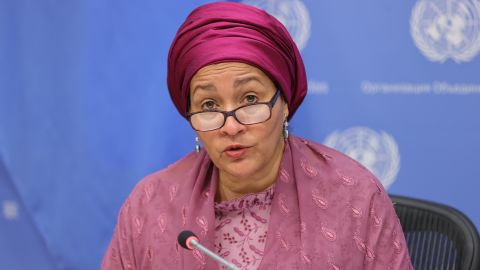Top UN female envoys meet Taliban in Kabul to discuss ban on women aid workers | CNN

CNN
—
Some of the United Nations’ most senior female officials have been meeting Taliban leaders in Kabul to discuss the ban on female aid workers, as Afghanistan battles famine and poverty.
In December the Taliban ordered all local and international non-governmental organizations to stop their female employees from coming to work or risk having their NGO licenses revoked. At least half a dozen major foreign aid groups have temporarily suspended their operations in Afghanistan as a result.
A UN statement noted that the visit comes at a time when more than 28 million people in Afghanistan require humanitarian assistance. According to the UN, Afghanistan is grappling with the risk of famine conditions, economic decline and entrenched poverty.
UN Deputy Secretary-General Amina Mohammed and the Executive Director of UN Women Sima Bahous met with the Taliban officials on Wednesday. They had previously met with groups of Afghan women in Ankara and Islamabad, as well as a group of envoys to Afghanistan based in Doha to address the the ban on female aid workers, and affirm “the need to continue to deliver lifesaving support.”
According to Reuters news agency, during the talks in Kabul, Mohammed “stressed the need to uphold human rights, especially for women and girls” and was “encouraged by exemptions” to the ban on female aid workers, UN spokesman Farhan Haq said. These have meant that some aid operations have resumed in healthcare, for instance.

At Mohammed’s meetings with officials in Turkey, Qatar and Pakistan, a “clear consensus was evident on the issue of women and girls’ rights to work and have access to education,” Reuters cited a statement released by the United Nations Assistance Mission in Afghanistan as saying.
Bahous wrote a statement shortly after the Taliban’s decree was issued in December, slamming the move. “In barring women from contributing to the efforts of aid organizations, the Taliban has in effect suspended aid for half the population of Afghanistan, aid that they depended on and without which they will not survive,” she wrote.
In the wake of the announcement, the UN said it had suspended some of its “time-critical” programs in Afghanistan due to the absence of female aid workers.
Half of Afghanistan’s population is experiencing acute hunger and while conflict has subsided, violence, fear and deprivation remain, a UN report in November found.
US troops withdrew from Afghanistan in August 2021, marking the end of America’s presence in the country, and the Taliban then swept to power. Although Afghan security forces were well funded and well equipped, they put up little resistance as Taliban militants seized much of the country.
The radical Islamist group initially appeared keen to distance itself from its earlier period of rule in the 1990s, presenting itself as more moderate and committed to the internal peace process. However, 17 months on, a series of decrees have steadily eroded the rights of women and girls in almost all aspects of life.








